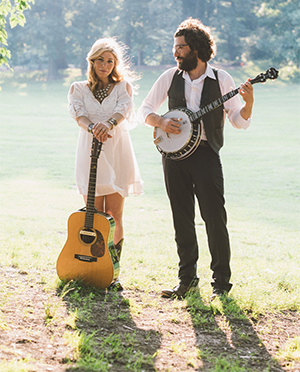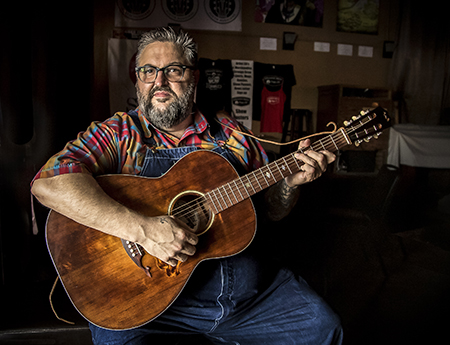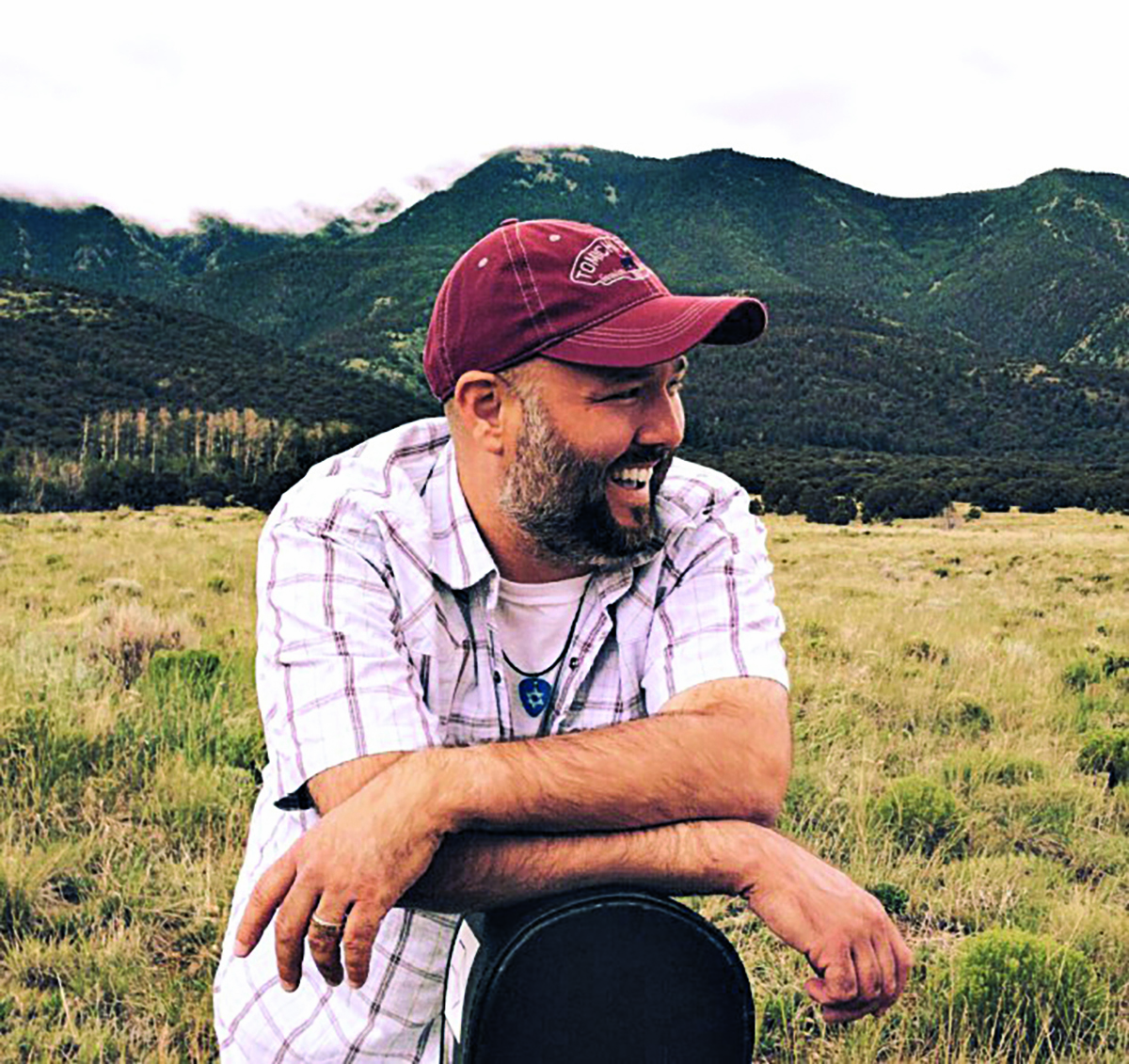Arts
Music
Jews Plus Bluegrass Equals Toe-Stompin’ Jewgrass

Banjo picker Eric Lindberg loves with a passion the distinctive harmonies of the acoustic country music known as bluegrass. However, he says, as a Jew, he long felt “a bit out of the loop.
“Much of the work from the inception and early days of bluegrass is deeply spiritual and Christian based,” says the dark-haired, darkbearded 30-something Lindberg, who also plays guitar. “Musically, I could connect with the songs on every level, but my identity as a Jew from Brooklyn always kept me from truly identifying with them.”
The solution? He and his wife, singer Doni Zasloff, formed a bluegrass band called Nefesh Mountain whose original songs meld bluegrass and old-time licks with lyrics reflecting Jewish traditions. “Nefesh is a Hebrew word which loosely translates as the soul or animating spirit of all living things,” they explain on the band’s website. “The mountain is a cross-cultural symbol used widely in Jewish text as well as in bluegrass and old-time musical forms.”
Bluegrass and old-time are two different approaches to traditional 20th-century American roots music, performed by ensembles made up mainly of stringed instruments such as fiddle, banjo, mandolin and guitar.
Nefesh Mountain’s 2016 debut album featured bluegrass greats Sam Bush, Mark Schatz, Scott Vestal, Rob Ickes and Gary Oleyar, and it included songs called “Singin’ Jewish Girl” and “Adonai Loves Me.” Lindberg and Zasloff are among the current crop of musicians who blend their deep-seated Jewish identities with an equally deep connection to traditional roots music—a fusion that some performers and critics dub “Jewgrass.”
Texas-born Joe Buchanan, who is in his early 40s, calls his tunes “feel-good, toe-tapping Americana with a Jewish soul.” A convert to Judaism, the twangy country troubadour wears a kippah or a hat when performing songs that include the text of prayers and unabashedly celebrate his embrace of the Jewish faith.
“And you can choose to be chosen/ You can stand up off your knees/And the reward for doing good/ Is the good in the world that you see,” he sings in the title track of his recent debut album, Unbroken.

New Orleans-based Mark Rubin, 51, a veteran of both the American roots and klezmer scenes, takes a different tack on his new album, Songs for the Hangman’s Daughter. In songs such as “Southern Jews Is Good News” and “Teshuvah,” Rubin, who was born in Stillwater, Okla., bluntly attempts to reconcile his experience as a culturally Jewish musician in the American South.
“It is not religious music in the usual sense,” says music critic Ari Davidow. Rubin “is in-your-face about who he is and how he doesn’t fit stereotypes. He is not just making a statement to anti-Semites who see Jews as aliens, but also to Jews of the coasts who find it alien to imagine that there are Jews who live in redneck territory, proudly embracing redneck values.”
The involvement of Jews with American roots music goes back decades, to the folk and old-time music revival that kicked off in the late 1950s and in which Jewish musician, musicologist and filmmaker John Cohen was a key figure. (Today, one of the top bluegrass artists is Jewish musician Noam Pikelny, recipient of the first annual Steve Martin Prize for Excellence in Banjo and Bluegrass in 2010, though he does not address his Jewish identity in his music.)
Mandolin and clarinet virtuoso Andy Statman and award-winning scholar and performer Henry Sapoznik, now director of the Mayrent Institute for Yiddish Culture at the University of Wisconsin, were both pioneers of the klezmer revival movement. They had been steeped in old-time and bluegrass before turning to Yiddish sources in the 1970s.
The two continue to perform American roots music. Sapoznik, 64, has just released his first old-time banjo recording in more than 30 years. “It’s exciting to return to my banjo roots,” he says. Called Banjew, it includes parlor songs, dance tunes, ballads—even a Yiddish medley.

“There has been from the beginning of the klezmer revival a thread running through it that comes out of involvement in American old-time and bluegrass,” says fellow klezmer revival pioneer Michael Alpert, 63.
Both Alpert and Statman, 67, are recipients of the National Endowment for the Arts’ National Heritage Fellowship, the country’s highest award in folk and traditional arts.
That thread emerges and submerges, Alpert notes. “The fact that there is a desire to bring out that thread again is a very American statement,” he adds. It’s saying bluegrass “is part of our larger musical tradition—as Americans—and is something that we choose to embrace.”
Ruth Ellen Gruber writes about Jewish culture and heritage and runs the website jewish-heritage-europe.eu.









 Facebook
Facebook Instagram
Instagram Twitter
Twitter
Leah says
As I write in Southern Jewish History’s “Kosher Country: Success and Survival on Nashville’s Music Row,” (http://www.jewishsouth.org/system/files/sjh_v._2_1999_harris.pdf), Monroe’s musicians included “a Milburn, New Jersey, fiddler… Gene Lowinger,” frequently introduced to fans as “the only Jewish bluegrass cowboy in the country.”
Further, Lowinger wasn’t country music’s only early Jewish fiddler. Maurice Blumen, known variously as “Mutt” or “Ripplin’ Ruben,” appeared with bands on the Grand Ole Opry from 1945 to 1952.”
Then there’s Bruce Adler. The “bluegrass Rabbi.”
The list goes on and on…
Stacy Harris
Publisher/Executive Editor
Stacy’s Music Row Report
http://stacyharris.com
Michael Abrams says
Thinking of.my late brother Rick who was national champion claw hammer banjo champion who died far too early. Rick Abrams was also a prizewinning newspaper reporter. He was a member of an Orthodox congregation. He won more banjo ribbons at the Galax Va. than probably anyone at the old time competition. His family and friends miss him dearly. Along the way he raised thousands of dollars to fight cancer by emceeing the Seminole Bluegrass Festival for years.
Michael Abrams says
Please edit few mistakes. Thanks, mike
Miriam Rosenblum says
This wonderful article is missing a reference to the Fabrangen Fiddlers who in the 1970’s and 1980’s wrote and performed Jewish music that was blended with American folk styles including Bluegrass.
Picker says
DAVID BROMBERG among the best
Stephanie P. Ledgin, music journalist/author says
Jewish-bluegrass connections are actually much more extensive than this wonderful article and the above comments take into consideration. Excerpting from my first (award-winning) book, Homegrown Music: Discovering Bluegrass (Praeger 2004): “New York City is America’s original melting pot. Breakfast Special grew out of New York’s Country Cooking in the seventies. It embraced the amalgam of ethnic influences found in New York City. Among others, it included fiddler Kenny Kosek and Cooking mandolinist Andy Statman. Incorporating traditional Jewish melodies and other ethnic infusions, the group explored the multi-cultural neighborhoods of the Big Apple in bluegrass context, adding a heavy dose of original material.” I went on to describe klezmer and other bluegrass artists that “mixed it up,” including Margot Leverett and the Klezmer Mountain Boys, profiled some years ago in Hadassah Magazine, as well the above mentioned Fabrangen Fiddlers and the Diaspora Yeshiva Band. From the Klezmatics, fiddler/composer/singer/songwriter Lisa Gutkin is currently receiving wide and well-deserved acclaim for her roles on Broadway’s “Indecent.” I will modestly mention that my first professional position in bluegrass was as assistant editor of the seminal bluegrass magazine Pickin’…..owned by Jewish partners. And by the way, I am not only a third generation Life member of Hadassah, I was Hadassah Magazine’s editorial assistant from 1981-82.
Ron Van Beuning says
Looking to hook up with some bluegrass pickers while in Israel Oct. 15-29,2017. Can anyone out there name some pickers/jams/groups/associations in Jerusalem and Tel Aviv?
Thanks,
Ron
Mel Globerman says
Check out the “yamilka under the cowboy hat” by Learner, on line. Very interesting and eye opening–
John Doemann says
Given time, they’ll declare bluegrass music was invented by the jews.
Mark Barnhart says
Not sure how to think about your comment. I’ll treat it as reflecting a lack of information.
Prior to about WWII, it was most often referred to as “mountain music,” as its origins are in the Appalachians, west of the Proclamation Line of 1763, meaning the settlements where it later arose were illegal. Enslaved populations brought with the them the ‘banjah’, a word the origin of which is not conclusively discerned. Mostly Celtic settlers, in the form of Scots-Irish, at that time only 3 generations removed from their original Scotland, contributed the bulk of the rest of the framework of the music, plus the religiosity and the style of the music. Doubtless there were Jews found among the settlers from the colonies east of the Proclamation Line, but I’ve found no indication is a casual web search of a Jewish “strain” or “theme” in what came to be characterized as bluegrass, nearly 2 centuries after the Proclamation Line was established. This being said, as one who’s loved bluegrass since I first encountered it and spent my teen-age years in Washington, DC’s Maryland suburbs (early ’70s), it’s easy enough to pick up on occasional resemblances between bluegrass and country-western music at large and klezmer music – viz. “Mama’s Broken Heart,” by Miranda Lambert.
Mel Globerman says
The following is an interesting article of Jews in Country and Bluegrass music, and why they are not known as Jewish.
https://srlerner.atavist.com/the-yamikah-under-the-cowboy-hat
Additionally, another very well-known singer/musician is Allison Krause. There are many others that can be easily found by Googling.
Mark Barnhart says
One of the “Kent State Four” was named Allison KrausE, born in 1951 in Cleveland, Ohio, and was, according to forward.com of April 28, 2010, Jewish, as were 2 of the remaining 3 who died in 1970. Wikipedia.org makes no mention of Allison KrausS, the musician born in Champaign, Illinois, in 1971, being Jewish. No, my research was not exhaustive, but I’m a big fan of Ms. Krauss’ music for 30 years and counting, and I’ve never heard this stated before. I think it would’ve come to my attention were it so, too, as Ms. Krauss has twice been awarded the Gospel Music Association Award (formerly the Dove Award, the dove being among the symbols of the Holy Spirit in orthodox Trinitarian Christianity).
Mark Barnhart says
My comment may betray my ignorance on a component of the article. I was watching a video by the bluegrass Southern gospel group The Isaacs, which is what drove me to look on the web for information, and as a result I stumbled across this article, which I found both delightfully interesting, and disappointingly surprising. I’m supposing my disappointment arises from my ignorance.
Are all the musicians featured in this article practicing Jews, does each belong or subscribe to a particular synagogue? If neither, how, then, does one determine to label them as Jewish? Lily Isaacs, one of the two founders of the aforementioned Southern gospel group, is the daughter of Polish Jewish survivors of the Shoah. According to wikipedia.org, she converted to Christianity (I don’t know which denomination) as an adult. Her children, who comprise the rest of the group, apparently all speak both English and Hebrew. They lead tours (of evangelical Christians, I expect) to the Holy Land and organize fundraisers to benefit the ever-dwindling number of Shoah survivors, as well as active-duty Israeli soldiers. Lily and at least one of her daughters compose at least some of their songs and perform them in Hebrew.
How is it that they do not appear in this article? The article indicates that Noam Pikelny doesn’t refer to his being Jewish in his work. Only one artist whose Judaism makes him a Jew by religion is identified, Joe Buchanan. Being Jewish appears as a theme among some of the remaining ones mentioned, but for some, neither religion nor culture is mentioned as a basis for their being considered Jewish, yet they’re mentioned in this article as examples of Jews involved in bluegrass music. I’ve seldom seen such musical skill as members of the Isaacs display. I’m trying not to deduce that the underlying criterion for mention in this article is that one may present one’s self or otherwise come to be reputed as being both Jewish and engaged in a certain behavior or practice, and one can have no religious profession at all, but one cannot have a religious profession other than Judaism.
I welcome and invite thoughtful admonition as to how to understand what I’m reading here – and what I found missing here. I see that the publisher of the magazine, Hadassah, identifies itself as the Women’s Zionist Organization of America, Inc., which to me is a beautiful string of deeply meaningful words, as I’ve always admired the work of Zionists across time, to establish a Jewish homeland in the Jewish nation’s ancient homeland, as promised to Abraham, Isaac, and Jacob.